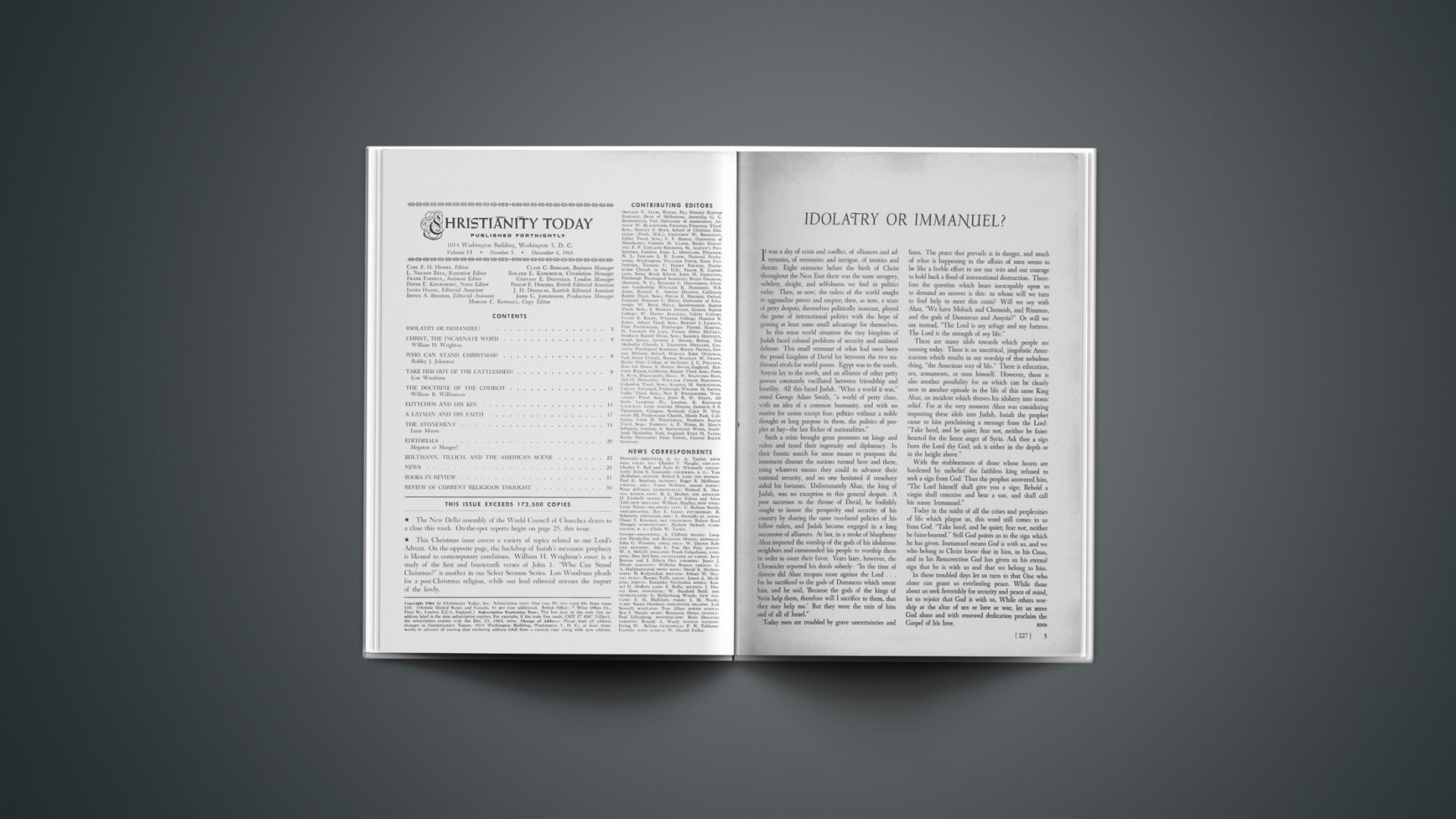It was a day of crisis and conflict, of alliances and adversaries, of emissaries and intrigue, of treaties and threats. Eight centuries before the birth of Christ throughout the Near East there was the same savagery, subtlety, sleight, and selfishness we find in politics today. Then, as now, the rulers of the world sought to aggrandize power and empire; then, as now, a score of petty despots, themselves politically insecure, played the game of international politics with the hope of gaining at least some small advantage for themselves.
In this tense world situation the tiny kingdom of Judah faced colossal problems of security and national defense. This small remnant of what had once been the proud kingdom of David lay between the two traditional rivals for world power. Egypt was to the south, Assyria lay to the north, and an alliance of other petty powers constantly vacillated between friendship and hostility. All this faced Judah. “What a world it was,” noted George Adam Smith, “a world of petty clans, with no idea of a common humanity, and with no motive for union except fear; politics without a noble thought or long purpose in them, the politics of peoples at bay—the last flicker of nationalities.”
Such a crisis brought great pressures on kings and rulers and taxed their ingenuity and diplomacy. In their frantic search for some means to postpone the imminent disaster the nations turned here and there, using whatever means they could to advance their national security, and no one hesitated if treachery aided his fortunes. Unfortunately Ahaz, the king of Judah, was no exception to this general despair. A poor successor to the throne of David, he foolishly sought to insure the prosperity and security of his country by sharing the same two-faced policies of his fellow rulers, and Judah became engaged in a long succession of alliances. At last, in a stroke of blasphemy Ahaz imported the worship of the gods of his idolatrous neighbors and commanded his people to worship them in order to court their favor. Years later, however, the Chronicler reported his deeds soberly: “In the time of distress did Ahaz trespass more against the Lord … for he sacrificed to the gods of Damascus which smote him, and he said, ‘Because the gods of the kings of Syria help them, therefore will I sacrifice to them, that they may help me.’ But they were the ruin of him and of all of Israel.”
Today men are troubled by grave uncertainties and fears. The peace that prevails is in danger, and much of what is happening in the affairs of men seems to be like a feeble effort to use our wits and our courage to hold back a flood of international destruction. Therefore the question which bears inescapably upon us to demand an answer is this: to whom will we turn to find help to meet this crisis? Will we say with Ahaz, “We have Moloch and Chemosh, and Rimmon, and the gods of Damascus and Assyria?” Or will we say instead, “The Lord is my refuge and my fortress. The Lord is the strength of my life.”
There are many idols towards which people are turning today. There is an uncritical, jingolistic Americanism which results in my worship of that nebulous thing, “the American way of life.” There is education, sex, armaments, or man himself. However, there is also another possibility for us which can be clearly seen in another episode in the life of this same King Ahaz, an incident which throws his idolatry into ironic relief. For at the very moment Ahaz was considering importing these idols into Judah, Isaiah the prophet came to him proclaiming a message from the Lord: ‘Take heed, and be quiet; fear not, neither be fainthearted for the fierce anger of Syria. Ask thee a sign from the Lord thy God; ask it either in the depth or in the height above.”
With the stubbornness of those whose hearts are hardened by unbelief the faithless king refused to seek a sign from God. Thus the prophet answered him, “The Lord himself shall give you a sign; Behold a virgin shall conceive and bear a son, and shall call his name Immanuel.”
Today in the midst of all the crises and perplexities of life which plague us, this word still comes to us from God. “Take heed, and be quiet; fear not, neither be faint-hearted.” Still God points us to the sign which he has given. Immanuel means God is with us, and we who belong to Christ know that in him, in his Cross, and in his Resurrection God has given us his eternal sign that he is with us and that we belong to him.
In these troubled days let us turn to that One who alone can grant us everlasting peace. While those about us seek feverishly for security and peace of mind, let us rejoice that God is with us. While others worship at the altar of sex or love or war, let us serve God alone and with renewed dedication proclaim the Gospel of his love.










